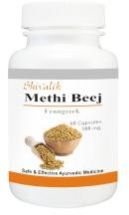
Methi Capsule
Get Price Quote
We are offering methi capsule.

Honey Zafrani Gastrointestinal Disorder Medicine
Get Price Quote
Honey Zafrani (Honey with Saffron) : Saffron is used as a nervine sedative and fevers, melancholia and enlargement of the liver. It also has stimulant, rejuvenative, expectorant, aphrodisiac, antispasmodic and stomachic properties. It has an essential oil, the active ingredient of which is aphrodisiac in nature. Its aphrodisiac virtue is due to the slight stimulation of the central nervous system. It is also used in spasmodic cough and asthma and in catarrhal affections of children. It is also given in anaemia, chlorosis and seminal debility. It also strengthens the heart, brain and liver. Saffron induces menstruation, treats period pain and chronic uterine bleeding. Saffron contains a chemical called “crocetin”, which has been determined to increase the oxygen content of the blood, which may in turn reduce plaque build up in arteries. Honey still retains its reputation as a remedy for chest complaints, particularly for removing phlegm. It acts as a decongestant and is also an effective treatment for colds, flu, and a generally depressed immune system. Whereas sugar shuts down the immune system, a good quality honey will stimulate it into action. Honey helps to retain calcium in the body. The French believed that newlyweds were to have drinks containing honey for 30 days following their wedding, and the word ‘honeymoon’ originated from this custom. In ancient times, honey was a source of sugar and was valued for its medicinal benefits. The medicinal uses of honey are mentioned in the Talmud, the Quran, and ancient Egyptian documents. The addition of honey to food helps stimulate digestion and regulate acidity. COMPOSITION : Each 200 gms. contains: Crocus sativus (Zafran) 1 gm. Mel (Shahed) 199 gms. INDICATIONS : Hyperacidity, phlegmatic cough, low immunity, colds, flu, anaemia, soar throat, asthma, bronchitis, arteriosclerosis, cardiovascular disorders, catarrh, convalescence, cough, depression, erectile dysfunction, indigestion, infertility, jaundice, lack of appetite, liver dysfunction, melancholia, menopausal changes, seminal debility, sexual debility, spasmodic cough and whooping cough.CONTRAINDICATIONS : NoneSIDE EFFECTS : NoneDOSAGE : One tablespoon twice a day.PRESENTATION : In packs of 200 gms.Ingredients used for Medicine : Mel, Crocus sativusMedicine used for Diseases : Anaemia, Asthma, Bronchitis, Erectile Dysfunction, Flu, Hyperacidity, Indigestion, Infertility, Jaundice, Catarrh, Convalescence, Depression, Sore Throat, General Debility, Sexual Debility, Melancholia, Spasmodic Cough, Seminal Debility, Whooping Cough, Common Cold, Liver Dysfunction, Lack of Appetite, Arteriosclerosis Atherosclerosis, Persistent Infection due to Low Immunity, Cardiovascular Disorder, Menopausal Changes, Phlegmatic Cough.
Best Deals from Gastrointestinal drug

Fenugreek Capsules
Get Price Quote
Fenugreek (Trigonella foenum-graecum) has a long history as a breast enlarger and contains diosgenin which is used to make synthetic estrogen. It promotes the growth of new breast cells and increase the size and fullness of the breasts. It is useful for anemia, pregnancy, lactation, diabetes, digestion, loss of taste, fever, hair care, dandruff, stomach disorders, biliousness, respiratory disorders, mouth ulcers, sore throat, diabetes, inflammations, wounds and insomnia. Fenugreek is used to treat wounds, inflammation and gastrointestinal ailments.While Fenugreek is considered the finest herb for enhancing feminine beauty it also aids in sexual stimulation, balances blood sugar levels, and contains choline which aids the thinking process. Its ability to balance hormone levels aids in treating PMS and menopause. Its antioxidants slow ageing and help prevent disease. Benefits of Fenugreek Control diabetes: Fenugreek helps to alleviate type II diabetes. According to one study, it may also help people with Type I diabetes. Study done by Indian researchers revealed that Fenugreek added to type I diabetic patient’s diet, helps drop urinary sugar level by 54 percent. Because of the presence of the natural fiber galactomannan, fenugreek slows down the rate at which sugar is absorbed into blood. The amino acid (4-hydroxyisoleucine) in Fenugreek induces the production of insulin and therefore, 15-20 grams of fenugreek daily is recommended for controlling blood sugar. Good for breast feeding mothers: India’s traditional ayurvedic physicians prescribe fenugreek to nursing mothers. Reduce menstrual discomfort: Fenugreek is considered as a potent menstruation ease promoter. Minimize symptoms of menopause: Fenugreek contains the chemicals diosgenin and estrogenic isoflavones, which are similar to the female sex hormone, estrogen. Loss of estrogen causes menopausal symptoms. So, eating fenugreek helps to reduce menopausal symptoms. Reduce cholesterol: Fenugreek consumption helps to reduce cholesterol level. Reduces cardiovascular risk: Fenugreek seed contains 25 percent galactomannan. This is a type of natural soluble fibre. This reduces cardiovascular diseases. Relief for sore throat: Fenugreek’s soothing mucilage helps to relieve sore throat pain and cough. Relieve constipation: Fenugreek adds bulk to the stool. So, it is helpful to treat constipation and diarrhoea and also relieves minor indigestion. Good for kidney troubles: Traditional Chinese medicine advises fenugreek for kidney patients. Prevent colon cancer: Fenugreek possesses anticarcinogenic potential. The steroid diosgenin in Fenugreek is colon cancer preventive. Good appetite suppressant: The natural soluble fibre galactomannan can swell in the stomach and thus, suppresses appetite.

Liver Tonic
Get Price Quote
Liver Tonic, Baby Tonic, Herbal Oil